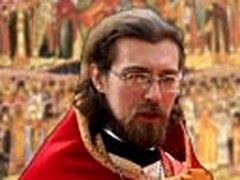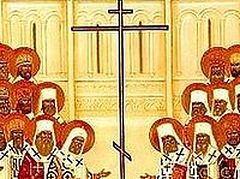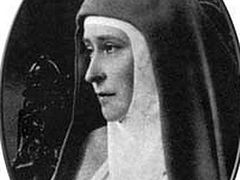Today the Russian Orthodox Church celebrates the memory of one of the early stars in the pleiades of new martyrs and confessors of the Communist yoke, Metropolitan Benjamin (Kazansky) of Petrograd and Gdovsk, together with Archimandrite Sergei, Yuri, and John.
Hieromartyr Benjamin was born Vasily Pavlovich Kazansky in 1873, in a village near Kargopol, now of Archangelsk province, to the family of Priest Pavel and his wife Maria Kazansky. He was raised in a spirit of piety, and loved to read the Lives of the Saints, contemplating the struggles of the martyrs, and wishing that he too could make that same sacrifice for Christ’s sake. Little could he know during that peaceful time in a quiet village that such an opportunity would indeed arise in his native Orthodox land.
Longing to serve the Church, Vasily entered the Petrozavodsk Seminary and then the Saint Petersburg Theological Academy. As a student, he participated actively in the “Society for the spread of religious and moral enlightenment in the spirit of the Orthodox Church,” and organized talks with workers. In 1895 he received the monastic tonsure with the name Benjamin and was ordained a hierodeacon, and the next year a hieromonk. After graduating from the Academy in 1897, Hieromonk Benjamin was appointed teacher of Holy Scripture at the Riga Theological Academy, then in 1898 the Inspector of the academy in the city of Kholm. A year later he was made inspector of the Saint Petersburg Seminary. In 1902, after being elevated to the rank of Archimandrite, he was appointed rector of the Samara Seminary, and three years later of the Saint Petersburg Seminary.
The scholarly yet pastoral hieromonk Benjamin was called to the hierarchical rank on January 24, 1910, when he was consecrated bishop of Gdovsk, a vicariate of Saint Petersburg, by other future martyrs and confessors such as Metropolitan Vladimir (Bogoyavlensky) and Archbishop Tikhon (Belavin) of Yaroslavl—the future Patriarch of Russia.
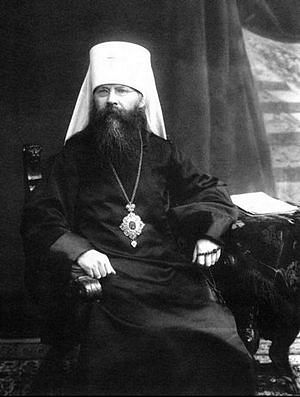
He was always able to reach the hearts of simple folk, and his flock loved him for this, calling him “our batiushka Benjamin”. His evangelical simplicity, compassion, pastoral accessibility, sincere smile and quiet, clear voice endeared him even to those of other faiths.
After the revolution in February, 1917, Bishop Benjamin was chosen by the overwhelming majority of clergy and laity at the diocesan council as Archbishop of Petrograd and Ladoga, and then six months later as Metropolitan of Petrograd and Gdovsk.
Right after his election to the Saint Petersburg cathedra His Eminence Benjamin announced: “I stand for the Church’s freedom. She should be alien to politics, for in the past she suffered much from them. To place a new path upon the Church now would be a great mistake. The most important task right now is to build and improve our parish life.”
In those confusing times it would have been hard to find a man more foreign to politics that Metropolitan Benjamin. He put all his energy into his social programs, and into defending the Orthodox people from the fierce persecutions now encroaching upon them from enemies of the Church. In 1918, the new government published a decree “On the separation of Church from the state and the schools from the Church”, which was everywhere received as a signal to begin the destruction of the Church and its leaders, and to plunder its property. A wave rolled over the county leaving behind it closed church and monasteries, desecrated icons and relics, arrested, tortured, exiled and executed bishops, priests, monks, nuns, and laity. The Church was deprived of its clergy and any means of existence.
 Patriarch Tikhon and Met. Benjamin
Patriarch Tikhon and Met. Benjamin
After the civil war, in 1921, Russia was stricken by an unprecedented famine amidst the general destruction, and this was used as an excuse to persecute and rob the Church under the slogan, “the proletarian campaign on Church valuables”. In Petrograd, they began this campaign in 1922. “We will give it over ourselves,” said Met. Benjamin, blessing the churches to submit anything of value that was not used in Divine Services to be used to help those in need.
But the authorities were not satisfied with the Metropolitan’s voluntary charity, because their aim was confiscation, and the declaration of Church property as state property—whether or not it was sacred was of no concern to them. By this time a schism had formed of renovationists calling themselves the “Living Church”, and collaborating with the Communist authorities against those faithful to the lawful Patriarch, Tikhon. Although initially there were no arrests in connection with the people’s unrest over the sacrilege, on March 24, 1922, twelve of the schism’s organizers published an article in the Petrograd Pravda accusing the lawful clergy of resisting the decree on confiscation and participating in counter-revolutionary conspiracies. In 1922 Metropolitan Benjamin was arrested, and on June 10 of the same year, 86 people were put on trial.
At his trial, Metropolitan Benjamin was as always simple, calm, and of pure conscience concerning himself and the others. When he was faced with his sentence, he said to the tribunal: “I do not know what sentence you will pass upon me—life or death—yet whatever your pronouncement, I will raise my eyes upward with the same reverence, make the sign of the Cross (here he crossed himself broadly) and say, “Glory to Thee, O Lord God, for all things!”
On June 5, 1922 the tribunal pronounced his sentence, and on the night of August 12-13, Metropolitan Benjamin along with Archimandrite Sergei (Shein), and laymen Yuri Novitsky and Ivan Kovsharov were shot to death outside of Petrograd.
Hieromartyr Archimandrite Sergei (in the world Vasily Pavlovich Shein) was born in 1866 in the village of Kolpina, Tula Province. He had been a member of the State Duma and the Holy Synod of the Russian Orthodox Church from 1917-1918, and assistant chairman of the Society of unified Petrograd Orthodox parishes.
Martyr Yuri (Yuri Petrovich Novitsky) was born in 1882 in Umani, Kiev Province. He was a professor of criminal law in Petrograd University, and chairman of the Society of unified Petrograd Orthodox parishes.
Martyr John (Joan Mikhailovich Kovsharov) was born in Odessa. He was a lawyer, and gave legal counsel to the St. Alexander Nevsky Lavra in Petrograd.
The memory of Holy Hieromartyrs Benjamin, Sergei, and martyrs Yuri and John is honored in the feast of the Synaxis of New Martyrs and Confessers of Russia, and separately on this day, July 31/August 13.1
Although the Russian Orthodox Church Abroad canonized the new martyrs earlier, the Moscow Patriarch passed the resolution for canonization in 1992. At the Council of Bishops in Danilov Monastery, His Holiness Patriarch Alexy gave a word on the New Martyrs being canonized at this council held March 31-April 4, which we cite below in part:
* * *
In the Name of the Father, and of the Son, and of the Holy Spirit!
Martyrdom is bearing witness to the Truth of Christ and God's Church to the death, and Christ Himself, the “Faithful Witness” (Rev., I:5), to this end was born, and for this cause came into the world, to bear witness unto the truth (John 18:37), and to give up His life through suffering on the Cross for the redemption of many.
In the words of the Apostle, we have been redeemed with the precious blood of Christ, as of a lamb without blemish and without spot (1 Peter 1:19). To bear Christian witness is to give glory to God in living and in dying: If we live, we live to the Lord, and if we die, we die to the Lord (Romans 14:8).
The persecution of Christ’s Church that arose in Russia in our time was God's will. And once again, as in ancient times, the blood of martyrs was shed in witness to the victory of Christ. Holy Patriarch Tikhon of All Russia, in considering the trials that had been visited upon his flock, courageously called upon them to share with him the cup of martyrdom. “If it becomes necessary to suffer for the sake of Christ, we call upon you, beloved sons and daughters of the Church, we call upon you to suffer together with us. If a redeeming sacrifice is required, the death of the innocent sheep of Christ's flock, I bless the faithful servants of the Lord Jesus Christ to pain and death for His sake.”
It would be impossible to name all the new martyrs of the Russian Church in the twentieth century. Nevertheless, we express the hope, that the proposed canonization of these first witnesses to the Truth, who in martyrdom shed their blood for Christ, will form the beginning of a further churchwide process of glorification of the many confessors of the Orthodox faith in our Church.
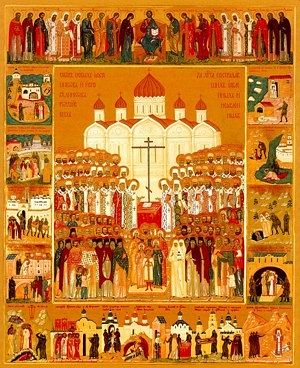 New Martyrs and Confessors of Russian Church
New Martyrs and Confessors of Russian Church
Another bishop and inspired man of prayer-Metropolitan Benjamin (Kazansky) of Petrograd and Gdovsk, spiritually nourished his faithful children, while persecution from without and factions from within threatened to shake Christ's Church. Faced with imminent death he said, “I am a faithful son of my people, whom I love and have always loved. I have given my life for them and I am blest in that the common people have repaid me with that same love, placing me in that position which I now hold in the Orthodox Church. I do not know what sentence you will pass upon me—life or death—yet whatever your pronouncement, I will raise my eyes upward with the same reverence, make the sign of the Cross and say, “Glory to Thee, O Lord God, for all things!”
The Archimandrite Sergius and the faithful, Yury Novitsky and John Kovsharov, who were murdered along with Metropolitan Benjamin as his faithful fellow warriors, went to the slaughter along with their bishop.2
* * *
Through the prayers of Holy Hieromartyr Benjamin and all the New Martyrs of Russia, may the Lord give us also the strength to confess His Name at all times.




